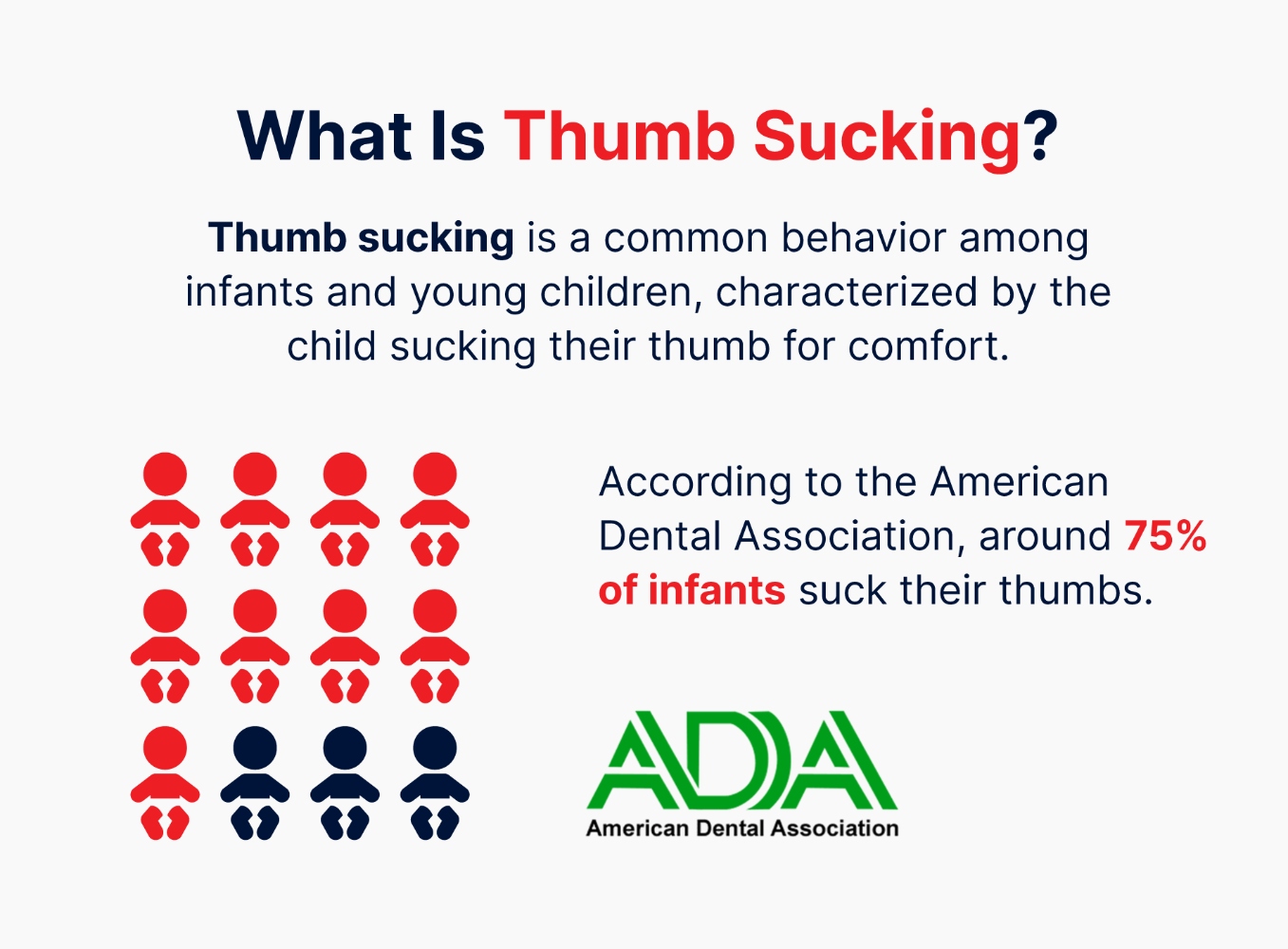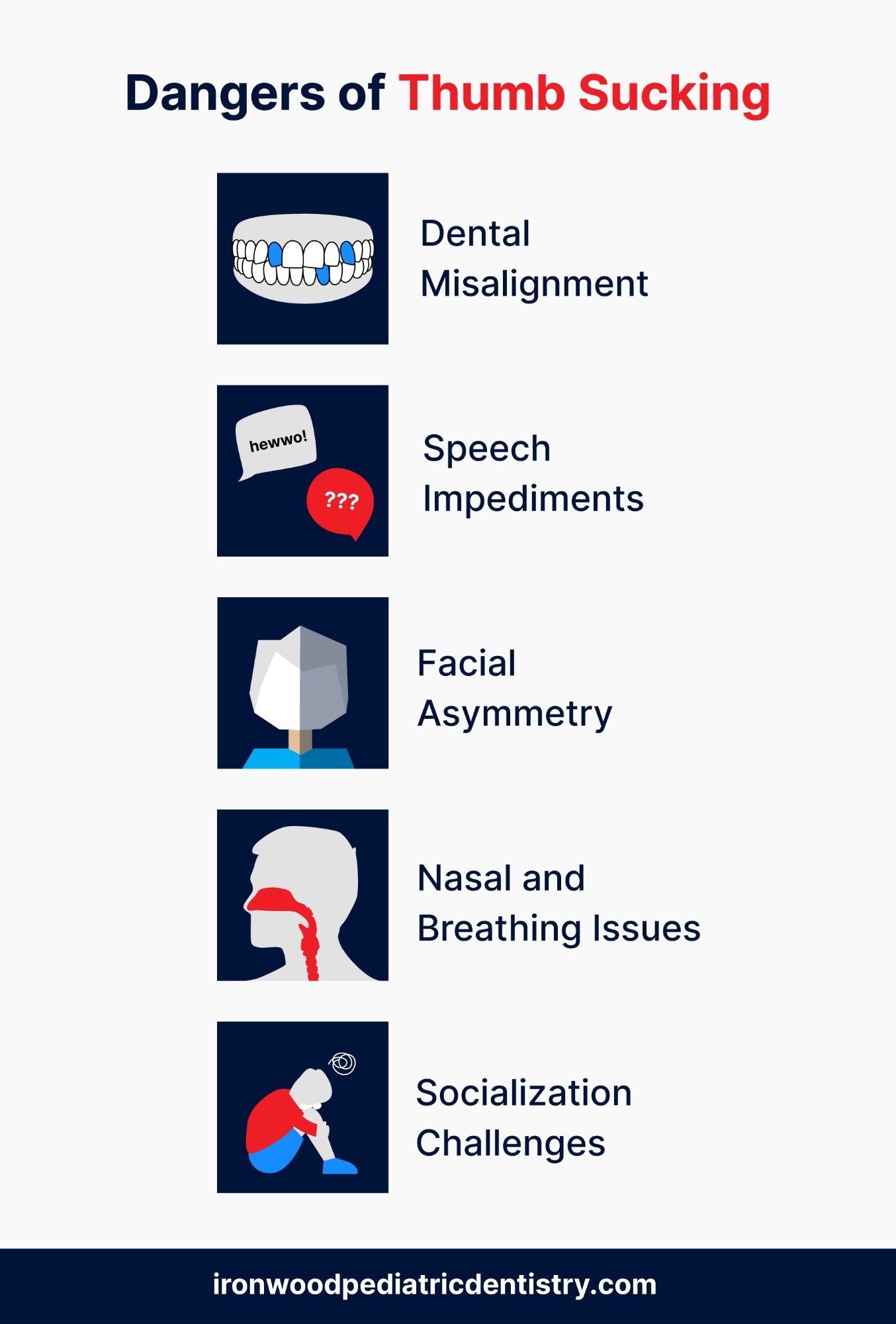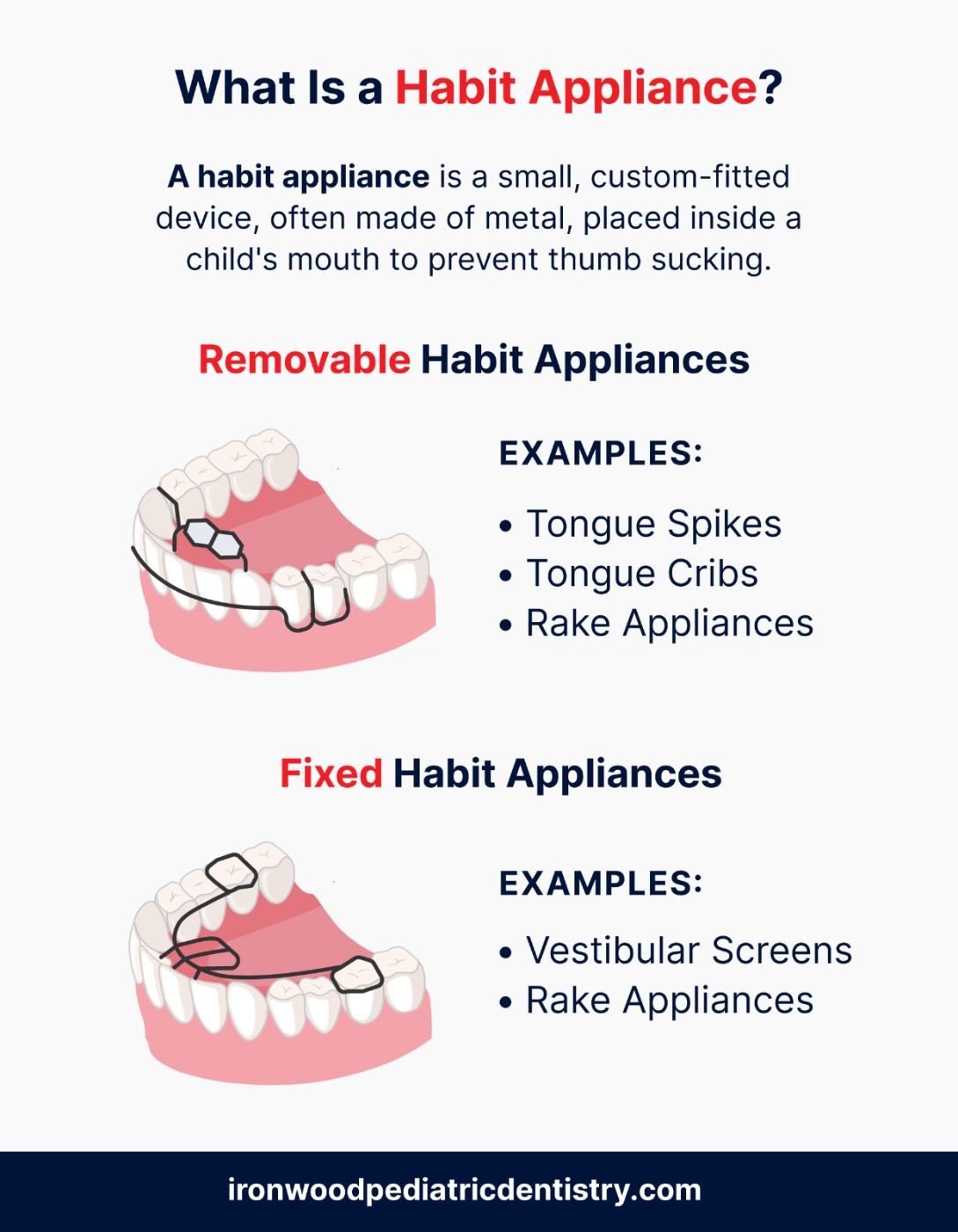How to Stop Thumb Sucking
Home Pediatric Dentistry Digit Sucking
What Is Thumb Sucking?
The term “thumb sucking” is a perfect example of “truth in advertising.” It is the act of your child placing his or her thumb in his or her mouth, and sucking on it.
Thumb sucking is a common natural reflex in young children. It can begin when babies suck on a finger or thumb while still in the womb. Thumb or finger sucking is not usually a serious issue in infants during toddler years, but once your child reaches the age of four, when baby teeth are giving way to your child’s permanent teeth, it is time to consider helping to break the habit.
Technically speaking, dentists refer to thumb sucking with the more accurate term, “digit sucking.” This is because although the thumb is most often used, children can suck on any of their fingers.
As pediatric dentists, our purpose is to help you help your child avoid dental problems, or to correct them when they occur. Our training and experience as child dentists gives us the ability to help you and your child to find appropriate ways to overcome the habit of thumb sucking.

What Causes Thumb Sucking?
Thumb sucking can have any of several causes, and not all medical professionals agree on what they are or their significance in causing the behavior. Some say that children might suck their thumbs because of emotional stress, feelings of insecurity, or incomplete or improper feeding. Other theories hold that prolonged nursing or pacifier use can cause it, or that it is simply a reflexive impulse.
What Are the Dental Effects of Thumb Sucking?
The effect of your child’s thumb sucking on their dental health depends on several factors: your child’s age, how often thumb sucking occurs, how long each occurrence lasts, the position of the thumb or finger in the mouth, and the leverage force applied against the upper and lower teeth, the roof of the mouth, or a combination
There are many kinds of harm that thumb sucking can contribute to. Most of them have names that may be unfamiliar to you, like labial tipping of the mandibular anterior teeth, bilateral posterior crossbite, and high palatal vault.
Other terms you might know are protruding teeth, misaligned teeth, and open bite.
More severe effects of children sucking their thumbs include dental issues like tongue thrusting during swallowing and speech, speech impediments, muscle problems in the lips, nasal problems, mouth breathing, tongue protrusion in between the upper and lower incisors, and facial asymmetry or an elongated face.
Although some studies have suggested a link between a child’s thumb sucking and the formation of tooth cavities, this has not been established to scientific certainty yet. What is known is that thumb sucking and poor oral hygiene often go together, and poor oral hygiene habits hamper your ability to prevent tooth decay.
What is important to remember is that past the age of four, the longer children suck their thumbs, the more likely it is to cause significant harm to their oral health. In most cases, if a child stops thumb sucking by age four, then any harm caused by the behavior is not permanent and will not need dental treatment to correct itself.
After age four, prolonged thumb sucking can lead to problems that can benefit from if not require dental treatment. This is particularly true if the behavior persists when your child’s permanent teeth, and especially the permanent incisor teeth, are beginning to erupt.
Longer-term oral health problems from thumb sucking include socialization, speech, and learning difficulties, often because of at least in part by malocclusion and jaw deformation.
As importantly, thumb sucking into later years of childhood can be a symptom of health problems that call for health care professionals in addition to your child’s dentist, like speech pathologists and emotional and mental health counselors.
How to Stop Thumb Sucking
The first thing to know when considering how to get children to stop sucking their thumbs is that you have not somehow “failed” as a parent because your child engages in it. Many children – persuasive evidence from some studies suggest most children – will at least sometimes indulge in the impulse, especially when they are very young.
The second thing to know is that if your child proves subconsciously resistant to your efforts to help stop thumb sucking, you have not “failed” here, either. Because it is a pleasurable habit, stopping thumb sucking for children can be as hard to do as quitting smoking is for some adults. It can require patience and flexibility in your approach, and not every option you try may work.
The third thing to know is that you should not try to stop thumb sucking too soon. Success in stopping any bad habit means that you must enlist your child as an ally with you. But what happens if your child is too young to be able to understand what you are trying to do, and why? Pushing too early can lead to anxiety in your child and frustration on your part that your child will perceive as a stressor. You must be the judge of when you believe your child can understand why you are doing what you are doing and consciously help you by going along with the effort.
The fourth thing to know is that helping your child to leave thumb sucking behind is a 24-hour-a-day job. This is because you must help guard against it during the day and at night, when many children rely on it to get to sleep and then unknowingly keep at it once they are asleep. It can take weeks or even months to overcome thumb sucking for good, and nighttime thumb sucking is usually the last to go away.
With these four fundamentals in mind, let’s consider some non-dental and dental treatment options for thumb sucking.
Preventive Treatment at Home
Second only to encouraging your children to brush and floss regularly after meals, helping them overcome thumb sucking as soon as is reasonably possible is the most important preventive health measure you can take at home to promote their lifelong oral health.
There are many things you can do to simultaneously discourage your child from thumb sucking and encourage your child to stop thumb sucking. For your reference purposes, we mention some of them below.
Please note, though, that as child pediatric dentists we are specialists in thumb sucking through dentistry.
Therefore, we offer no judgments or recommendations about any non-dental treatment method mentioned below. Nor should you read what we write about non-dental treatment options as treatment advice.
Psychological and Emotional Treatment Options
Thumb sucking is a form of self-soothing behavior in children. This suggests that attempts to discourage thumb sucking through shaming, yelling, grounding, or other punitive measures can be counterproductive, because these heighten stress and can encourage the child to engage in thumb sucking furtively.
Treatment methods that rely on encouraging your child to abandon thumb sucking often use positive reinforcement or reward-based tactics, like giving your child a tangible token of recognition after a day of no thumb sucking, or offering gentle reminders — like wrapping the offending thumbs in waterproof bandages or tape. Some over-the-counter remedies include “chemical reminders,” bitter substances that you paint on the thumb or finger that are used for thumb sucking—the chemical having an unpleasant taste.
Other ways parents use to prevent nighttime thumb sucking while sleeping include using items to cover the hand. This can be as simple as a sock, a glove, or even a hand puppet.
Helping your child to fall asleep at night can reduce the subconscious need for thumb sucking as a self-help sleep aid. As much as possible, bedtime should be as low-stress a time as you can make it. If your child is young enough, reading a bedtime story can help.
Dental Treatments for Thumb Sucking
Sometimes, what you do at home to help your child to kick the thumb sucking habit can benefit from support from your pediatric dentist. We can help in the following situations:
- When your child is three years old or older and is still engaged in thumb sucking.
- When you have tried other methods to discourage thumb sucking and these have not worked.
In these cases, we can provide what are known as “habit appliances” to help your child to stop thumb sucking behaviors. In more difficult situations, we might also recommend the services of an oral myologist.
What Is a Habit Appliance?
A habit appliance is a small, custom-fitted device, usually made of metal, that we attach to the inside of your child’s mouth behind the upper teeth. A habit appliance prevents a thumb, finger, or the tip of the tongue from making contact with the teeth or gums behind the front teeth. This, in turn, helps to stop sucking behavior by reducing your child’s sense of satisfaction or reward from thumb sucking or tongue-thrusting during swallowing.
Types of habit appliances include:
- Removable appliances. Examples of these devices are tongue spikes, tongue cribs, and rake appliances.
- Fixed appliances. These include vestibular screens and some rake appliances. These remain in your child’s mouth from four to six months. After three months, if thumb sucking has stopped, then we will begin a gradual removal of a fixed appliance over another three months.
What Does an Oral Myologist Do?
An oral myologist is a specialist working with muscles of your child’s face, tongue, mouth, and jaw to support behavioral modification like cessation of thumb sucking and tongue thrusting, dental development, and speech development.
Oral myologists do not always become involved in thumb sucking treatment, but if prolonged thumb sucking leads to consequences like malocclusion, speech disorders, or jaw deformation then they can serve an important role in reinforcing the efforts of your pediatric dentist in changing thumb sucking and tongue thrust behavioral patterns.
Call Us in Scottsdale to Help Your Child Overcome Thumb Sucking
If your child is three years old or older and is still engaging in thumb sucking, and your efforts to assist in stopping it are not working, call us at our Scottsdale office, 480-422-4544. We can answer your questions about thumb sucking, and help you decide if a consultation visit for your child can help.
Or, if you prefer, you can contact us online to make an inquiry or to set up a pediatric dentistry appointment.
Remember, helping your child overcome thumb sucking early, before dental treatment is needed, can prevent potentially serious oral and speech problems later in life. It can also make your child’s experiences growing up and socializing easier, and help address other possible underlying emotional and stress-related issues.
Call us today. 480-422-4544. About thumb sucking habits, regular dental visits, or any other question you have about your child’s teeth or overall dental health.


